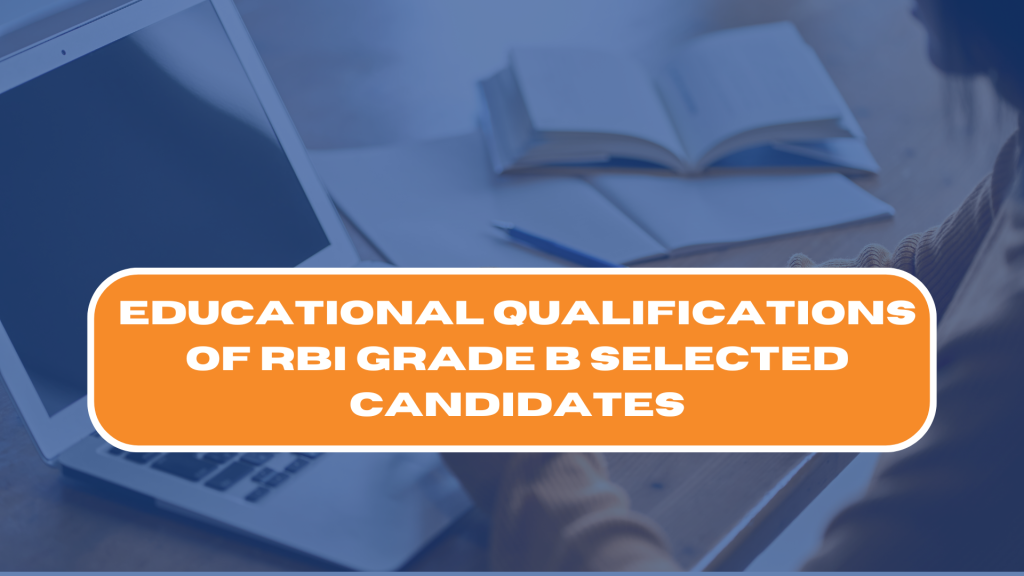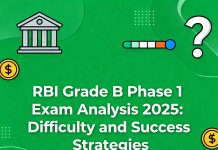The RBI Grade B exam is one of the most prestigious banking and finance sector examinations in India. Conducted by the Reserve Bank of India (RBI), this exam offers an opportunity to work in one of the most esteemed financial institutions in the country. Every year, thousands of aspirants apply for a limited number of vacancies, making the competition highly intense.
One of the key aspects of preparation for this exam is understanding the educational qualifications of successful candidates. The RBI Grade B exam attracts candidates from diverse academic backgrounds, including commerce, economics, management, finance, engineering, and even science and humanities. Since the exam covers a broad syllabus, including economic and social issues, finance and management, and quantitative aptitude, candidates from different educational streams have their own unique advantages.
Aspirants often wonder if a particular degree or specialization gives them an edge in the selection process. While candidates with degrees in economics, finance, and management may find it easier to grasp certain sections of the syllabus, those from engineering or science backgrounds often excel in quantitative aptitude and logical reasoning. Additionally, candidates from reputed institutions like the Indian Institutes of Management (IIMs), Indian Institutes of Technology (IITs), Delhi School of Economics (DSE), and other premier universities have historically performed well in the exam.
By analyzing the educational trends of successful candidates, future aspirants can gain valuable insights into how different fields of study contribute to success in the RBI Grade B exam. This analysis can help aspirants choose the right study approach, leverage their academic strengths, and develop a well-rounded strategy for clearing the exam.

RBI Grade B Eligibility Criteria
The Reserve Bank of India (RBI) has outlined specific educational qualifications for candidates appearing in the RBI Grade B exam. To be eligible, a candidate must have completed a bachelor’s degree with a minimum of 60% marks or an equivalent CGPA. However, candidates belonging to the SC, ST, or PwBD categories are given a relaxation, requiring only 50% marks. The calculation of the percentage is based on the cumulative performance across all semesters or years of graduation.
Apart from the basic RBI Grade B eligibility criteria, candidates with higher educational qualifications are also eligible. Those who have completed a master’s degree, or hold professional qualifications such as Chartered Accountant (CA), Company Secretary (CS), or Chartered Financial Analyst (CFA), can apply for the exam. Additionally, for certain specialized RBI Grade B recruitments, a degree in specific fields is required. For example, recruitments for the Department of Economic & Policy Research (DEPR) and the Department of Statistics & Information Management (DSIM) mandate a postgraduate degree in Economics, Finance, or Statistics. The table below summarizes the educational qualifications required for the RBI Grade B exam
| Criteria | Specifications |
| Educational Criteria | Graduation in any discipline /Equivalent technical or professional qualification with minimum 60% marks (50% for SC/ST/PwBD applicants) |
| Age Criteria | Minimum-21 Years / Maximum-30 Years |
| Age Relaxation | Minimum-3 Years / Maximum-13 Years |
Most Common Educational Backgrounds of RBI Grade B Selected Candidates
While RBI allows candidates from various educational disciplines, a trend can be observed among those who clear the exam. The majority of selected candidates belong to the following backgrounds:
Commerce and Finance Graduates
A significant portion of RBI Grade B officers come from educational backgrounds in Commerce, Finance, and Accounting. Many candidates pursuing this prestigious position hold degrees such as Bachelor of Commerce (B.Com), Master of Commerce (M.Com), Master of Business Administration (MBA) with a specialization in Finance, Chartered Accountancy (CA), or Chartered Financial Analyst (CFA) certifications. These fields equip candidates with a strong foundation in financial management, banking operations, and economic policies, all of which are directly relevant to the RBI Grade B exam syllabus & exam pattern. The Commerce and Finance disciplines cover essential subjects such as macroeconomics, microeconomics, corporate finance, risk management, and monetary policies, enabling aspirants to grasp key RBI functions with ease.
Engineering Graduates
Engineers, especially those from IITs, NITs, and other top-tier institutions, have consistently performed well in the RBI Grade B exam. Their strong quantitative and analytical skills provide them with a significant advantage in sections like Quantitative Aptitude and Logical Reasoning, which are crucial components of the Phase 1 examination. Many engineers, recognizing the need for domain-specific knowledge in banking and finance, opt to pursue an MBA in Finance, Economics, or related fields before attempting the RBI Grade B exam. This additional qualification helps them bridge the gap between their technical background and the economic and financial aspects of the exam syllabus.
Economics and Statistics Graduates
Given the RBI Grade B exam’s emphasis on economics and finance, candidates with a degree in Economics, Statistics, or Mathematics often have a strong foundation in the subjects tested. These fields equip aspirants with in-depth knowledge of economic theories, statistical methods, and data analysis, which are essential for understanding monetary policy, financial markets, and macroeconomic trends. Postgraduate degrees such as MA or MSc in Economics provide a significant edge, particularly in Phase 2’s Economic and Social Issues (ESI) and Finance & Management (FM) sections. Additionally, some specialized RBI Grade B recruitments specifically seek candidates with a Master’s in Economics, Econometrics, or Statistics.
Management and MBA Graduates
An increasing number of MBA graduates, especially those specializing in Finance, Banking, and Economics, have been successfully clearing the RBI Grade B exam. Their academic background provides them with a strong understanding of financial markets, risk management, investment strategies, and corporate finance, all of which align with the exam’s syllabus.
Moreover, their expertise in economic policies, business regulations, and financial decision-making proves invaluable during the interview stage, where candidates are expected to demonstrate practical knowledge of banking and financial systems. The case-study approach in MBA programs also helps aspirants develop problem-solving and analytical skills, making them well-prepared for RBI’s selection process.
Chartered Accountants (CA), Company Secretaries (CS), and Cost Accountants (CMA)
Candidates with professional qualifications such as CA (Chartered Accountant), CS (Company Secretary), and CMA (Cost Management Accountant) possess a deep and comprehensive understanding of financial statements, accounting principles, and regulatory frameworks. These qualifications equip them with the skills to analyze financial data, interpret balance sheets, and understand complex financial regulations. Their expertise in finance, auditing, taxation, corporate governance, and cost management gives them a competitive edge in the Finance & Management (FM) sector. With their ability to navigate financial complexities and make informed decisions, these candidates are highly sought after for roles in both private and public sectors.
Representation from Premier Institutions
The RBI Grade B final selection process often sees candidates from prestigious institutions, such as the Indian Institutes of Technology (IITs) and National Institutes of Technology (NITs), which are renowned for their rigorous academic training in technical and analytical skills. Additionally, candidates from the Indian Institutes of Management (IIMs), which specialize in management and leadership, bring strong strategic and problem-solving abilities to the table. Other leading institutions like the Delhi School of Economics, Jawaharlal Nehru University (JNU), and the Indian Statistical Institute (ISI) provide candidates with a deep understanding of economics, finance, and statistical analysis, which are essential for the RBI Grade B role. Candidates from top universities like the University of Delhi, Mumbai University, Kolkata University, and other central universities also contribute to the selection pool, as they benefit from competitive environments, research opportunities, and exposure to cutting-edge academic frameworks, all of which play a pivotal role in shaping successful aspirants for the exam.
Open University and Distance Learning Candidates
Candidates from institutions like IGNOU and other Open Universities have also found success in the RBI Grade B exam, demonstrating that the mode of education is not a barrier to achieving this prestigious position. For these candidates, the key to success lies in complementing their formal education with dedicated self-study, professional certifications, and practical exposure to finance, economics, and management.
By leveraging online resources, attending workshops, and staying updated on industry trends, distance learners can build a strong foundation in the subjects required for the exam. Since RBI does not differentiate based on the mode of education, candidates from Open Universities who put in the necessary effort, focus on thorough preparation, and gain relevant skills can clear the exam and secure a position in the RBI Grade B cadre, competing on equal footing with their counterparts from traditional institutions.
Importance of a Postgraduate Degree for RBI Grade B Exam
While a master’s degree is not a mandatory requirement for the RBI Grade B exam, many successful candidates hold advanced qualifications such as a Master’s in Economics, Finance, Statistics, or Management. These degrees provide a deeper understanding of core subjects like macroeconomics, monetary policy, banking regulations, and financial markets, which prove beneficial during both the written exam and the interview stage.
Candidates with postgraduate education often have stronger conceptual clarity, analytical skills, and research experience, which help them articulate well-structured responses during interviews. Additionally, some PhD holders in Economics and Finance also appear for the exam, though their numbers are relatively lower. Their advanced research expertise and deep subject knowledge can be advantageous, particularly in policy-related discussions. While higher qualifications provide an edge, success ultimately depends on a candidate’s overall preparation, conceptual clarity, and ability to apply theoretical knowledge to real-world economic and financial scenarios.
How Educational Background Influences RBI Grade B Exam Preparation
Commerce and Finance graduates generally find the Finance & Management (FM) section easier due to their academic background in accounting, financial management, and business principles. However, they may find the Quantitative Aptitude section challenging, especially if they lack regular practice in advanced mathematical concepts.
Engineers, on the other hand, excel in Quantitative Aptitude and Reasoning Ability, as their training involves logical problem-solving and numerical analysis. However, they often need extra effort to grasp concepts in Economics and Finance, which are crucial for both the Economic & Social Issues (ESI) and FM sections.
Economics graduates have a strong foundation in macroeconomics, monetary policy, and social issues, making them well-prepared for the ESI section. However, they may need additional preparation to master financial regulations, corporate finance, and management principles in the FM section.
Candidates with professional qualifications such as CA and MBA possess in-depth knowledge of finance, accounting, and management, giving them a significant advantage in the FM section. Their expertise in financial statement analysis, corporate governance, and risk management makes them strong contenders for RBI Grade B selection.
Summing Up
The RBI Grade B exam is open to candidates from all educational backgrounds, provided they meet the eligibility criteria. However, aspirants with Commerce, Economics, Finance, or Engineering degrees tend to dominate the selection list. That said, success in this exam depends more on dedicated preparation, analytical thinking, and conceptual clarity rather than just academic qualifications. Regardless of your degree, with the right strategy and consistent effort, clearing the RBI Grade B exam is possible. Start your preparation early, understand the syllabus thoroughly, and focus on descriptive writing, current affairs, and financial awareness to enhance your chances of success.
At ixamBee, we specialize in providing comprehensive online courses for government exams and online courses for government jobs. Our expertly designed courses for government jobs cater to a wide range of upcoming government exams. Whether you’re preparing for specific courses for government exams or seeking general guidance, ixamBee offers the resources like Beepedia previous year papers, SSC CGL, SSC CHSL, SSC MTS and other mock tests to succeed in exams like RBI Grade B, SEBI Grade A, NABARD Grade A, RRB NTPC, SSC MTS, NIACL Assistant, and more.
Also Read:
Union Budget 2025-2026: Everything You Should Know
Everything to know about RBI Grade B Previous Year Cutoffs
A Guide to RTI Insights and RBI Recruitment Opportunities













